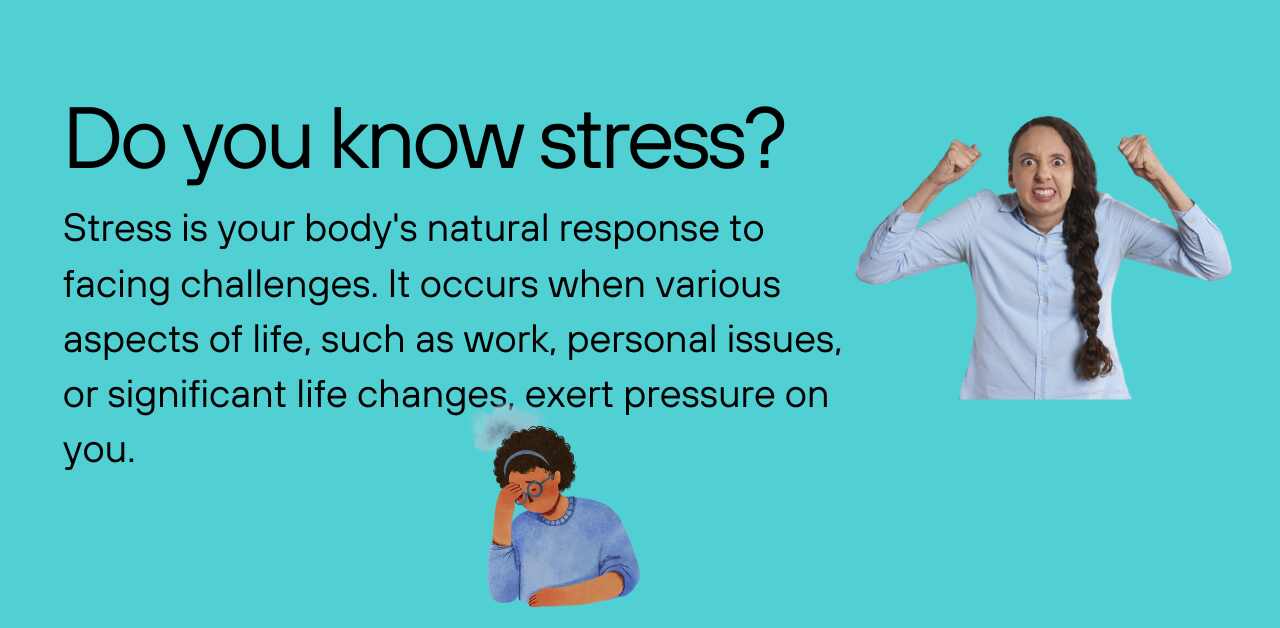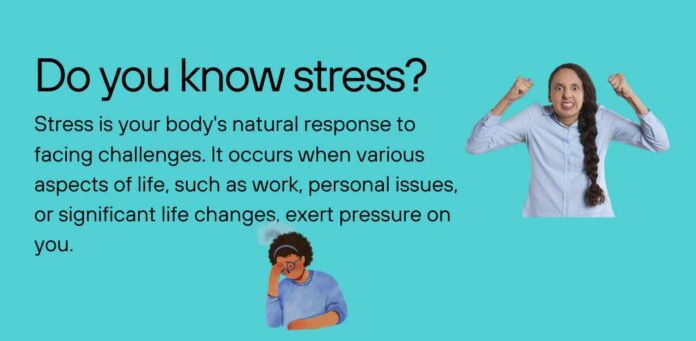Introduction
Do you know that stress is something that we all experience in our lifetime? And this can have a bad and deep impact on our mind and body. In this short article, we will try to understand in detail the concept of stress, its identification, different types of stress, and coping strategies.
What is stress?
Stress is your body’s natural response to facing challenges. It occurs when various aspects of life, such as work, personal issues, or significant life changes, exert pressure on you.

Do you know the signs and symptoms of stress?
Stress manifests in a variety of ways. It can make you feel anxious and irritable and may even lead to physical health problems by influencing your thoughts, emotions, and behaviors.
How can stress make you feel
Stress is a common experience in our daily lives, often triggered by various factors such as work, relationships, finances, and health concerns. It manifests differently for each individual but can profoundly impact mental health and overall well-being.
- Feeling irritable, angry, impatient, or wound up
- Sense of being over-burdened or overwhelmed
- Experiencing anxiety, nervousness, or fear
- Racing thoughts and difficulty switching off
- Inability to enjoy oneself
- Feeling depressed or uninterested in life
- Loss of sense of humor
- A sense of dread or worry
- Feeling tense or neglected
- Existing mental health problems worsening
- Some individuals may experience suicidal feelings under severe stress.
How stress makes you behave
How stress makes you behave refers to the different behavioral changes and actions that a person may exhibit when experiencing stress. They are given below.
Do you know stress physical symptoms of stress
Stress can result in symptoms such as headaches, tense muscles, and sleep disturbances. Prolonged stress can even lead to more severe health issues.
- Breathing difficulties.
- Panic attacks.
- Blurred vision or sore eyes.
- Sleep disturbances.
- Fatigue.
- Muscle pain and headaches.
- Chest pain and elevated blood pressure.
- Digestive issues such as indigestion or heartburn.
- Changes in bowel habits, including constipation or diarrhea.
- Feeling nauseous, dizzy, or faint.
- Sudden changes in weight, either gain or loss.
- Skin changes like rashes or itching.
- Increased sweating.
- Alterations in menstrual cycle or period.
- Exacerbation of existing physical health conditions.
Stress Hormone
When under stress, your body releases hormones like cortisol, which prepares you to confront challenging situations, making you decide whether to “fight or flight.”
- Stress hormones are chemicals released by the body in response to stressors.
- The primary stress hormones are cortisol and adrenaline, also known as epinephrine.
- Cortisol helps regulate metabolism, immune function, and blood sugar levels during times of stress.
- Adrenaline triggers the body’s “fight or flight” response, increasing heart rate and blood pressure.
- Chronic stress can lead to dysregulation of stress hormone levels, contributing to various health problems.
- Stress hormones are produced by the adrenal glands, located on top of the kidneys.
- Cortisol levels typically follow a daily pattern, peaking in the morning and declining throughout the day.
- Prolonged elevation of cortisol levels can impair cognitive function and suppress the immune system.
- Stress hormones play a role in the body’s response to both physical and psychological stressors.
- Managing stress through relaxation techniques, exercise, and healthy lifestyle habits can help regulate stress hormone levels.
Do you know methods for assessing stress
There are diverse ways to gauge your stress levels, ranging from simple questionnaires to more intricate tests that measure how your body reacts to stress.
Stress Management Techniques
- Effectively managing stress is crucial for your overall well-being. You can employ techniques like relaxation exercises, physical activity, and seeking support from friends, family, or professionals.
Here are some stress management techniques to help you cope with and reduce stress
- Deep Breathing: Deep breathing techniques are those techniques. Practice deep breathing exercises to calm your nervous system. Inhale slowly through your nose, hold for a few seconds, and then exhale slowly through your mouth. Repeat several times.
- Progressive Muscle Relaxation: Progressive Muscle Relaxation is those techniques that tense and then relax each muscle group in your body, starting from your toes and working your way up.
- Meditation and mindfulness: this technique helps you stay in the present moment, lowering the impact of stressful thoughts about the past or future.
- Exercise: What are those techniques. If you continue to do physical activity, endorphins continue to be released. which is a natural mood lifter. Even a short walk can help lower the stress.
- Healthy, balanced diet: A balanced diet with plenty of fruits, vegetables, and whole grains can provide the nutrients your body needs to cope with stress.
- Adequate Sleep: Ensure you get enough quality sleep, as lack of sleep can increase stress.
- Time Management: Time management techniques are those that prioritize tasks and set realistic goals.
- Reduce Caffeine and Alcohol: Excessive consumption of caffeine and alcohol can contribute to stress and anxiety.
- Breathing Techniques: Breathing techniques are those that can help calm your nervous system.
- Hobbies and Leisure Activities: Engage in activities you enjoy, whether it’s reading, gardening, painting, or playing a musical instrument.
- Cognitive Behavioral Therapy (CBT): Consider therapy with a trained professional to address and change negative thought patterns and behaviors that contribute to stress.
- Set realistic expectations: Avoid perfectionism and accept that not everything needs to be perfect. Striving for excellence is great, but demanding perfection can lead to stress.
- Limit Screen Time: Reduce exposure to stressors from news or social media. Continued exposure to negative information can increase your stress levels.
- Seek Social Connections: Spend time with loved ones, join social groups, or participate in community activities to build a support network.
- Laugh and enjoy: Laughter is a very powerful stress reliever. You should spend as much or more time with people who make you laugh.
- Professional Help: If stress becomes overwhelming and disturbs your daily life, consider seeking help from a mental health professional for therapy or counseling.
Do you know the types of stress
- Psychological stress: This type impacts your thoughts and emotions, often leading to anxiety or sadness.
- Acute stress: It’s intense but short-term stress, frequently arising from immediate challenges, and can be both beneficial and harmful.
- Chronic Stress: This is prolonged stress stemming from ongoing issues, such as work-related pressures or personal problems, and it’s detrimental to your health.
- Money stress pertains to concerns about financial matters, like insufficient funds or managing debt.
- Mental Stress: This stress is primarily cognitive and emotional, potentially contributing to mental health issues if not managed properly.
- Diathesis Stress: This perspective explores how your genetics and life events interact to create certain conditions or disorders. Your genetic makeup may increase the likelihood of a problem, and stress can exacerbate it.
- Toxic Stress: This is an especially challenging and persistent form of stress, often resulting from traumatic or adverse experiences, particularly during childhood. It can have profound and lasting effects on your body and mind.
- How to Manage Stress: The key to handling stress effectively is to find the strategies that work best for you. Consider techniques such as mindfulness, effective time management, and seeking professional assistance when necessary.
Conclusion
Stress is an inevitable part of life, but with a proper understanding of its indicators, awareness of its various types, and the application of stress management techniques, you can lead a happier and healthier life. Always prioritize your well-being and seek help when faced with the challenges of stress.
Hear some frequently asked questions given below related to stress.
What is the cause of stress?
Stress can take many forms, both external and internal. Common stressors include work-related pressures, personal or family issues, financial difficulties, health concerns, major life events, environmental factors, daily hassles, and traumatic events.
How many of types of stress
There are three primary types of stress:
- Acute stress: Acute stress is short-term stress that occurs in response to immediate challenges or threats.
- Episodic acute stress: Episodic acute stress is characterized by repeated episodes of acute stress caused by repeated high-pressure situations or excessive anxiety.
- Chronic stress: long-lasting stress caused by ongoing issues such as financial problems, relationship difficulties, or work-related stress.
What is stress, and what is its cause?
Stress is a natural physical and psychological response to the challenges and demands in our lives. It can be triggered by a variety of factors, including work-related pressures, personal issues, financial problems, health concerns, major life events, environmental factors, daily hassles, and traumatic events. Stress is the body’s way of preparing for a “fight or flight” response when it senses a threat or challenge.
What is stress and what are its types?
Stress is a physical and psychological response to the challenges and demands of life. The three primary types of stress are acute stress, episodic acute stress, and chronic stress. Acute stress is short-term and results from immediate challenges or threats. Episodic acute stress involves recurring episodes of intense stress, often caused by high-stress situations or extreme anxiety. Chronic stress is long-lasting and results from ongoing issues such as financial difficulties, relationship problems, or work-related stress. Each type of stress can have different effects on a person’s well-being and health.





[…] an attempt to cope with stress or mask their emotions, some men turn to substances like alcohol or drugs. Unfortunately, substance […]
[…] back discomfort, such as wincing or grimacing, may be an automatic acknowledgment of affliction or stress, potentially affiliated with heart-related […]
[…] Stress refers to the body’s response to demanding situations, triggering physical, emotional, and behavioral changes. Chronic stress can negatively impact mental health, leading to anxiety, depression, and other health issues. […]
[…] essential to differentiate between stress and pressure. While stress is the body’s natural response to demands or changes, pressure […]